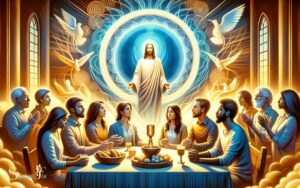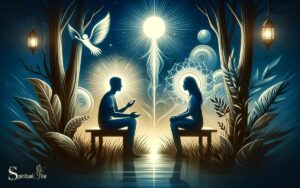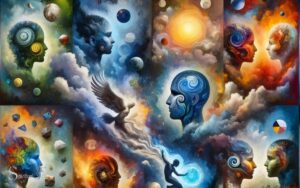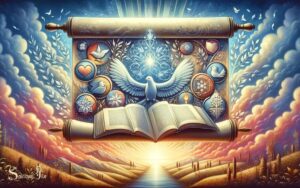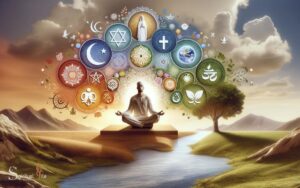Does a Spiritual Person Believe in God: Inner Peace!
A spiritual person may or may not believe in God. Spirituality is a broad concept that encompasses a search for meaning, purpose, and connection that can be theistic (involving belief in God or gods) or non-theistic, focusing on inner peace, interconnectedness.
Spirituality is often associated with religion, but the two are not synonymous. A spiritual person seeks to understand life’s deeper meaning and connect with something greater than themselves, which can be a divine entity, nature, the universe, or their inner self.
For instance, someone might practice meditation to achieve spiritual peace without adhering to any particular religious doctrine.
Whether through meditation, nature, or religious practice, a spiritual person engages in a personal journey to explore the essence of their being and place in the world.
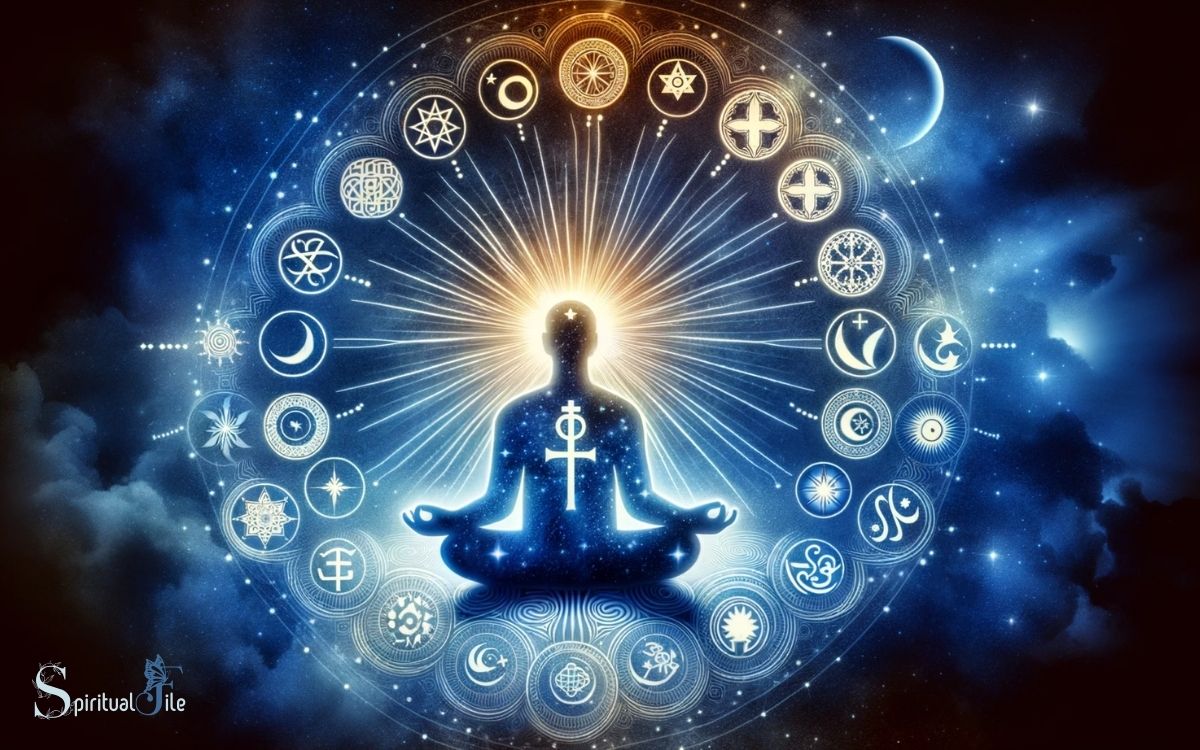
Key Takeaway
Defining Spirituality and God
I believe that defining spirituality and God requires a careful examination of personal beliefs and experiences. Spirituality, to me, is the deep sense of connection to something greater than oneself. It’s about finding meaning, purpose, and direction in life.
This can be through organized religion, nature, art, or even through acts of kindness and compassion. It’s a personal journey that often involves seeking inner peace and harmony.
On the other hand, God, for many people, represents the divine being or higher power that is worshipped and revered. However, the concept of God can be diverse and deeply personal, varying from person to person.
Some may see God as a specific deity, while others may perceive God as a universal energy or force. Understanding these definitions is crucial in exploring the relationship between spirituality and God.
The Diversity of Spiritual Beliefs
As I explore the diversity of spiritual beliefs, I’ve come to realize that spirituality extends beyond traditional religious boundaries. It’s fascinating to see how individuals personalize their spiritual experiences, finding meaning and connection in unique ways.
This diversity reminds me that spirituality is deeply personal and can transcend the confines of organized religion.
Belief Beyond Religion
The belief in a higher power often extends beyond traditional religious frameworks, encompassing a diverse range of spiritual perspectives and practices.
Personally, I’ve encountered people who find spiritual connection in nature, the universe, or even within themselves. Some may believe in the interconnectedness of all living beings, while others find spiritual fulfillment through meditation, mindfulness, or energy healing practices.
There are those who embrace ancient wisdom traditions like Shamanism or Taoism, while others resonate with New Age beliefs such as crystal healing or astrology.
For many, spirituality is a deeply personal journey that transcends the boundaries of organized religion, allowing individuals to explore and cultivate their own unique relationship with the divine.
This diversity of spiritual beliefs enriches our understanding of the human experience and the pursuit of greater meaning in life.
Personalized Spiritual Experiences
Exploring spiritual beliefs reveals a rich tapestry of diverse perspectives and practices that individuals engage with to cultivate their own unique connection with the divine.
In my own journey, I’ve encountered a wide range of spiritual beliefs and experiences, each deeply personal and meaningful to those who hold them.
Here are some examples:
- Some individuals find spiritual fulfillment through meditation and mindfulness practices, focusing on inner peace and harmony.
- Others connect with nature, seeing the divine in the world around them and finding spiritual meaning in the cycles of life.
- Certain people engage in rituals and ceremonies, drawing on cultural traditions and ancient wisdom to connect with the spiritual realm.
- Many individuals explore mysticism and esoteric teachings, seeking a deeper understanding of the metaphysical and transcendent aspects of existence.
- Some find spiritual fulfillment through acts of service and compassion, seeing the divine in the connections forged through kindness and empathy.
As we delve into these diverse spiritual experiences, it becomes clear that the search for meaning and connection with the divine takes many forms.
This diversity enriches our understanding of spirituality and invites us to embrace the myriad ways in which individuals seek and find spiritual fulfillment.
Exploring Non-Theistic Spirituality
Certainly! Here’s the first sentence for the subtopic ‘Exploring Non-Theistic Spirituality’:
Many spiritual individuals, including myself, embrace non-theistic forms of spirituality rooted in introspection and interconnectedness.
When it comes to non-theistic spirituality, it’s important to recognize that it’s not necessarily about the belief in a higher power or deity. Instead, it often revolves around finding meaning and purpose through practices such as mindfulness, meditation, and ethical living.
Here’s a comparison to shed light on this concept:
| Non-Theistic Spirituality | Theistic Spirituality |
|---|---|
| Focuses on inner wisdom and interconnectedness | Centers around belief in a higher power |
| Emphasizes mindfulness and ethical living | Involves worship and prayer |
| Rooted in personal growth and interconnectedness | Revolves around devotion and faith |
The Role of Belief in God
As I consider the role of belief in God, I’m drawn to the idea of God as a guiding force in one’s life. Each individual’s interpretation of belief in God is deeply personal and can significantly shape their spiritual journey.
It’s fascinating to explore how this belief influences and informs the spiritual practices and experiences of different people.
God as Guiding Force
While I believe in the concept of a guiding force, my personal spirituality does not necessarily require a belief in a traditional deity.
For me, the idea of God as a guiding force encompasses broader principles that influence my spiritual beliefs.
- Universal Energy: I perceive God as a universal energy that connects all living beings.
- Inner Wisdom: I believe in accessing God’s guidance through intuition and inner wisdom.
- Nature’s Harmony: My understanding of God includes the harmony and interconnectedness present in nature.
- Moral Compass: I view God as a source of moral guidance, shaping my ethical decisions and actions.
- Personal Growth: My concept of God involves a force that supports my personal growth and journey towards self-realization.
These aspects form the basis of my belief in a guiding force, shaping my spirituality without necessarily relying on a traditional deity.
Personal Interpretation of Belief
Believing in God plays a pivotal role in shaping my personal interpretation of spirituality. For me, belief in God provides a sense of purpose and guidance. It’s not about blindly following a set of rules, but rather about finding meaning and direction in life through a divine presence.
My belief in God allows me to feel connected to something greater than myself, which brings comfort and strength during difficult times.
This belief influences my values, decisions, and interactions with others. It’s important to note that personal interpretations of belief in God can vary widely.
Here’s a table to illustrate the diverse ways individuals perceive the role of belief in God:
| Perspective | Description |
|---|---|
| Faithful Follower | Finds guidance and solace in religious teachings |
| Questioning Seeker | Struggles with doubts but seeks spiritual understanding |
| Apathetic Skeptic | Feels indifferent or disconnected from religious beliefs |
| Spiritual But Not Religious | Seeks connection with the divine outside traditional religion |
| Agnostic | Unsure about the existence of God or divine beings |
Intersecting Paths: Spirituality and Religion
I find it fascinating how spirituality and religion intersect in various ways, shaping individuals’ beliefs and practices.
As I’ve explored this intersection, I’ve come to understand that:
- Many people find spiritual fulfillment within the structure and community of organized religion.
- Some individuals blend elements of different religious traditions to create a personalized spiritual practice.
- Others identify as spiritual but not religious, drawing from diverse sources such as nature, meditation, and personal experiences.
- Certain religious traditions incorporate spiritual practices such as meditation, mindfulness, and connecting with a higher power.
- The boundaries between spirituality and religion can be fluid, with individuals moving between the two based on their evolving beliefs and needs.
Navigating Doubt and Uncertainty
In my journey of spirituality, navigating doubt and uncertainty has been an essential aspect of my personal growth. Doubt and uncertainty are natural parts of the human experience, and they often arise on the path of spiritual exploration.
It’s okay to question and wrestle with uncertainty; it doesn’t diminish the depth of one’s spirituality. In fact, it can lead to a more profound understanding and connection with one’s beliefs.
I’ve learned that embracing doubt can be a catalyst for spiritual growth, pushing me to seek greater understanding and wisdom. It’s through navigating doubt and uncertainty that I’ve found resilience and a deeper sense of faith.
It’s important to remember that doubt doesn’t equate to a lack of spirituality; rather, it can be a stepping stone to a more profound and authentic spiritual connection.
Conclusion
In the vast landscape of spirituality, belief in God is just one path among many. Like a river flowing through a diverse terrain, spirituality can be navigated with or without the presence of a deity.
Whether we find our faith in the embrace of a higher power or in the interconnectedness of all things, the journey of the spiritual person is a deeply personal and ever-evolving exploration of the mysteries of existence.

